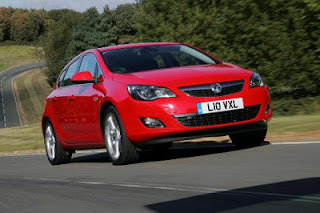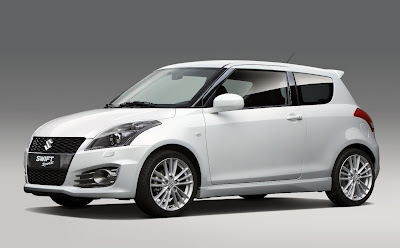99 g/km Astra ecoFLEX
The Vauxhall Astra is already one of the neatest looking cars in its class, and now it’s among the most economical and environmentally friendly, too.
With a revised 1.7 CDTi diesel engine, the latest Astra ecoFLEX joins a growing list of C-segment models that produce under 100 g/km of CO2.
But while competitors from Volvo and the Volkswagen Group match the Astra on emissions, the Vauxhall boasts lower fuel consumption and a higher power output. On those last two measures, it even eclipses the Toyota Prius and Auris hybrids:
Various measures have been employed to help the Astra attain its mix of power and economy.
The engine has been comprehensively reworked, and it now features a new fuel injection system, variable geometry turbocharger and engine management system that lets it operate at a lower compression ratio. A lot of the internals are now low friction, and there’s even an oil cooler bypass that lets the engine get up to its optimum operating temperature more quickly.
Drive is via a specially adapted six-speed manual transmission. Again, attention has been paid to reducing mechanical friction, and it comes equipped with a shift indicator to encourage more efficient driving.
Apart from the drivetrain enhancements, the Astra ecoFLEX comes with brake energy regeneration and stop-start systems, both of which are now virtually obligatory for any eco-car.
The aerodynamics have also been tweaked to further reduce fuel burn. Ride height has been lowered by 12 mm, while the grille has an active shutter which closes when less throttle load is required. Completing the package are low rolling resistance tyres.
Achieving 99 g/km brings several benefits to UK drivers. These include zero-rated Vehicle Excise Duty, a full discount on the London Congestion Charge, and qualification for the lowest Benefit In Kind tax band for company car users.
So, whatever your views on global warming, there are definite financial advantages to be gained from running a low CO2 car. The only potential downside is that more people are going to change their buying habits accordingly, meaning that the tax authorities will eventually realise that they’re missing out on a huge chunk of revenue.
Consequently, the chances of those ‘free’ thresholds falling from 100 g/km to something much lower in the future have to be high.
Prices for the Astra ecoFLEX have yet to be announced, but it will be available in Exclusiv, SE and SRi specifications. Deliveries are expected to begin later this year.
Related posts:
2011-12 company car tax
Zero Congestion Charge
Police spec Astra
With a revised 1.7 CDTi diesel engine, the latest Astra ecoFLEX joins a growing list of C-segment models that produce under 100 g/km of CO2.
But while competitors from Volvo and the Volkswagen Group match the Astra on emissions, the Vauxhall boasts lower fuel consumption and a higher power output. On those last two measures, it even eclipses the Toyota Prius and Auris hybrids:
| Manufacturer | Model | Fuel Type | CO2 Emissions | Fuel Consumption | Power |
|---|---|---|---|---|---|
| Vauxhall | Astra 1.7 CDTi ecoFLEX | Diesel | 99 g/km | 76.3 mpg (3.7 l/100km) | 128 bhp (95 kW / 130 PS) |
| Audi | A3 1.6 TDIe | Diesel | 99 g/km | 74.3 mpg (3.8 l/100km) | 103 bhp (77 kW / 105 PS) |
| Seat | Leon 1.6 CR TDI Ecomotive | Diesel | 99 g/km | 74.3 mpg (3.8 l/100km) | 103 bhp (77 kW / 105 PS) |
| Skoda | Octavia 1.6 TDI Greenline | Diesel | 99 g/km | 74.3 mpg (3.8 l/100km) | 103 bhp (77 kW / 105 PS) |
| Toyota | Auris Hybrid | Petrol Hybrid | 89 g/km | 74.3 mpg (3.8 l/100km) | 97 bhp (73 kW / 99 PS) |
| Toyota | Prius | Petrol Hybrid | 89 g/km | 72.4 mpg (3.9 l/100km) | 97 bhp (73 kW / 99 PS) |
| Volkswagen | Golf 1.6 TDI BlueMotion | Diesel | 99 g/km | 74.3 mpg (3.8 l/100km) | 103 bhp (77 kW / 105 PS) |
| Volvo | S40 DRIVe | Diesel | 99 g/km | 74.3 mpg (3.8 l/100km) | 113 bhp (84 kW / 115 PS) |
Various measures have been employed to help the Astra attain its mix of power and economy.
The engine has been comprehensively reworked, and it now features a new fuel injection system, variable geometry turbocharger and engine management system that lets it operate at a lower compression ratio. A lot of the internals are now low friction, and there’s even an oil cooler bypass that lets the engine get up to its optimum operating temperature more quickly.
Drive is via a specially adapted six-speed manual transmission. Again, attention has been paid to reducing mechanical friction, and it comes equipped with a shift indicator to encourage more efficient driving.
Apart from the drivetrain enhancements, the Astra ecoFLEX comes with brake energy regeneration and stop-start systems, both of which are now virtually obligatory for any eco-car.
The aerodynamics have also been tweaked to further reduce fuel burn. Ride height has been lowered by 12 mm, while the grille has an active shutter which closes when less throttle load is required. Completing the package are low rolling resistance tyres.
Achieving 99 g/km brings several benefits to UK drivers. These include zero-rated Vehicle Excise Duty, a full discount on the London Congestion Charge, and qualification for the lowest Benefit In Kind tax band for company car users.
So, whatever your views on global warming, there are definite financial advantages to be gained from running a low CO2 car. The only potential downside is that more people are going to change their buying habits accordingly, meaning that the tax authorities will eventually realise that they’re missing out on a huge chunk of revenue.
Consequently, the chances of those ‘free’ thresholds falling from 100 g/km to something much lower in the future have to be high.
Prices for the Astra ecoFLEX have yet to be announced, but it will be available in Exclusiv, SE and SRi specifications. Deliveries are expected to begin later this year.
Related posts:
2011-12 company car tax
Zero Congestion Charge
Police spec Astra


+Front+Side.jpg)

%2BFront%2BSide.jpg)
+Front+Side+1.jpg)



Comments
Post a Comment